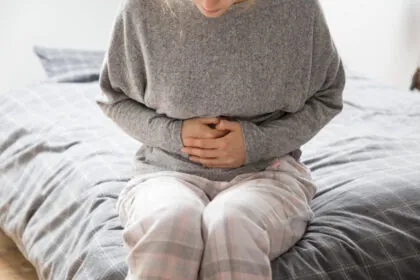Crohn’s disease is a chronic inflammatory bowel disease (IBD) that can affect any part of the digestive tract, from the mouth to the anus. It is characterized by inflammation and damage to the gastrointestinal tract, and it typically occurs in the small intestine and the beginning of the large intestine (colon).
Common symptoms of Crohn’s disease include abdominal pain, diarrhea, weight loss, fatigue, and malnutrition.
Among the many challenges faced by those with Crohn’s Disease, one often overlooked concern is hair loss. Hair loss can be distressing, affecting not only an individual’s physical appearance but also their self-esteem and overall well-being.
The severity of symptoms can vary widely from person to person.
Crohn’s disease is characterized by inflammation that can occur in segments or patches, leaving healthy tissue in between.
This can lead to complications such as strictures (narrowing of the intestines), fistulas (abnormal connections between different parts of the intestine or between the intestine and other organs), and abscesses (localized collections of pus).
The exact cause of Crohn’s disease is not well understood, but it is believed to involve a combination of genetic, environmental, and immune system factors.
It may be related to an abnormal response of the immune system to certain triggers, including the gut microbiome.
Crohn’s disease is typically diagnosed through a combination of medical history, physical examination, blood tests, imaging studies (such as X-rays, CT scans, or MRI), endoscopy (colonoscopy or upper endoscopy), and biopsy of affected tissue.
Treatment for Crohn’s disease aims to reduce inflammation, relieve symptoms, and improve quality of life.
It often involves medications like anti-inflammatory drugs, immune system suppressors, and biologics.
In some cases, surgery may be necessary to remove damaged portions of the intestine or treat complications.
Some individuals with Crohn’s disease find that certain foods can trigger or worsen symptoms.
Some may benefit from a low-residue diet or specific dietary modifications.
Living with Crohn’s disease can be challenging, as it often involves periods of active disease with symptoms and periods of remission.
Support from healthcare professionals, family, and support groups can help individuals manage their condition and improve their quality of life.
Can Crohn’s Disease cause hair loss?
Crohn’s disease can indirectly lead to hair loss due to a combination of factors related to the disease and its impact on the body.
Here are some of the key reasons why Crohn’s disease can contribute to hair loss:
Malnutrition
Malnutrition associated with Crohn’s disease can cause hair loss because it deprives the body of essential nutrients necessary for the growth and maintenance of healthy hair. When the digestive tract is affected by Crohn’s disease, particularly during flare-ups, the absorption of nutrients is impaired, which can lead to a range of nutrient deficiencies. Here’s how malnutrition contributes to hair loss in individuals with Crohn’s disease:
- Protein Deficiency:
Protein is a vital component of hair structure, and it plays a crucial role in hair growth and maintenance.
Malnutrition in Crohn’s disease can lead to protein deficiency, which can result in weaker, thinner, and more brittle hair. - Iron Deficiency Anemia:
Iron is necessary for the production of hemoglobin, which carries oxygen to the hair follicles.
Iron deficiency anemia, a common consequence of Crohn’s disease-related malnutrition, can lead to reduced oxygen supply to the hair follicles, causing hair to become weak and prone to shedding. - Vitamin and Mineral Deficiencies:
Crohn’s disease can lead to deficiencies in various vitamins and minerals, including vitamin D, vitamin B12, folic acid, and zinc, among others.
These nutrients are important for maintaining healthy hair growth, and their deficiency can disrupt the hair growth cycle, leading to hair loss. - Folate Deficiency:
Folate, or vitamin B9, is essential for DNA synthesis and repair.
A deficiency in folate can affect the production of new hair cells and contribute to hair loss. - Reduced Nutrient Absorption:
Inflammation and damage to the intestinal lining in Crohn’s disease can reduce the body’s ability to absorb nutrients from food.
This compromised absorption affects the availability of essential nutrients for hair health.
Medications
Medications used to treat Crohn’s disease can sometimes cause hair loss as a side effect.
While not everyone experiences this side effect, it can occur in some individuals.
The specific medications associated with hair loss in Crohn’s disease management include:
- Corticosteroids:
Corticosteroids, such as prednisone, are often prescribed to manage inflammation and symptoms during Crohn’s disease flare-ups.
Hair thinning or hair loss can be a side effect of these drugs, particularly at higher doses or with long-term use.
The mechanism by which corticosteroids lead to hair loss is not entirely understood, but it may involve hormonal changes and alterations in the hair growth cycle. - Immunosuppressants:
Immunosuppressive drugs, like azathioprine, 6-mercaptopurine, and methotrexate, are used to suppress the immune system’s response and reduce inflammation in Crohn’s disease.
These medications may affect the hair follicles, leading to hair loss in some cases. - Biologics:
Biologic drugs, such as infliximab, adalimumab, and vedolizumab, are designed to target specific proteins in the immune system to reduce inflammation.
Hair loss is a relatively rare side effect of these medications but has been reported in some individuals.
Stress
Stress induced by Crohn’s disease can contribute to hair loss through several mechanisms. While stress itself does not directly cause hair to fall out, it can disrupt the normal hair growth cycle and contribute to hair thinning and shedding. Here’s how stress associated with Crohn’s disease can lead to hair loss:
- Telogen Effluvium:
Stress can trigger a condition known as telogen effluvium.
This condition causes more hair follicles than usual to enter the telogen (resting) phase of the hair growth cycle.
During this phase, hair is more likely to be shed, resulting in increased hair loss.
Stress, both physical and emotional, is a common trigger for telogen effluvium. - Inflammation:
The chronic inflammation associated with Crohn’s disease can create a proinflammatory state in the body.
This systemic inflammation can affect various bodily functions, including those related to hair growth.
Inflammation may disrupt the hair growth cycle and lead to hair problems. - Compromised Immune Function:
Stress can weaken the immune system, making the body more susceptible to various health issues.
When the immune system is compromised, it may not effectively protect hair follicles from potential damage or infection, which can negatively affect hair growth. - Behavioral Factors:
People with Crohn’s disease may experience stress-related behaviors, such as poor dietary choices, inadequate sleep, and a lack of exercise.
These factors can contribute to overall health problems, including hair loss. - Psychological Impact:
The emotional toll of living with a chronic condition like Crohn’s disease can lead to significant stress and anxiety.
These emotional factors, combined with the physical burden of the disease, can create a vicious cycle where stress exacerbates symptoms, leading to more stress and potential hair loss.
Reducing stress can potentially help minimize the risk of stress-related hair loss and improve the overall quality of life for individuals with Crohn’s disease.
Nutrient Deficiencies
Nutrient deficiencies caused by Crohn’s disease can lead to hair loss because several key vitamins and minerals are essential for maintaining healthy hair growth and preventing hair problems.
When the body lacks these vital nutrients due to the effects of Crohn’s disease on nutrient absorption and utilization, it can result in hair thinning, hair loss, and other hair-related issues.
Here are some examples of how nutrient deficiencies associated with Crohn’s disease can contribute to hair loss:
- Iron Deficiency:
Crohn’s disease can lead to chronic gastrointestinal bleeding and malabsorption, which can cause iron deficiency anemia.
Iron is essential for the production of hemoglobin, a protein that carries oxygen to body tissues, including the hair follicles.
When there is insufficient iron, the hair follicles may not receive an adequate oxygen supply, leading to weakened, brittle hair that is prone to shedding. - Vitamin D Deficiency:
Vitamin D is crucial for hair follicle health and hair growth.
A deficiency in vitamin D can disrupt the hair growth cycle and lead to hair thinning and hair loss. - Biotin Deficiency:
Biotin, a B-vitamin, is important for the strength and health of hair.
A deficiency in biotin can result in brittle hair, hair loss, and changes in hair texture. - Zinc Deficiency:
Zinc is essential for the proper functioning of the hair follicles.
A zinc deficiency can disrupt the hair growth cycle, leading to hair thinning and hair loss. - Vitamin B12 Deficiency:
Vitamin B12 is involved in the production of red blood cells, which carry oxygen to the hair follicles.
A deficiency in vitamin B12 can lead to anemia and hair problems. - Folate (Vitamin B9) Deficiency:
Folate is important for DNA synthesis and repair.
A deficiency in folate can affect the production of new hair cells, potentially leading to hair loss.
The combination of malnutrition and nutrient malabsorption in Crohn’s disease can result in these deficiencies. Hair follicles are sensitive to the availability of essential nutrients, and when these nutrients are lacking, it can negatively affect the hair growth cycle and the overall health of the hair.
Inflammatory Response
The inflammatory response associated with Crohn’s disease can indirectly contribute to hair loss through several interconnected mechanisms.
While the inflammatory response itself does not directly cause hair to fall out, it can disrupt the normal hair growth cycle and lead to hair thinning and shedding.
Here’s how the inflammatory response in Crohn’s disease can affect hair health:
- Nutrient Malabsorption:
Chronic inflammation in the gastrointestinal tract, a hallmark of Crohn’s disease, can impair the absorption of essential nutrients.
As a result, individuals with Crohn’s disease may experience malnutrition, including deficiencies in key vitamins and minerals necessary for hair health.
These nutrient deficiencies can disrupt the hair growth cycle and lead to hair loss. - Systemic Inflammation:
Inflammatory molecules, such as cytokines and prostaglandins, can circulate throughout the body, affecting various organs and systems.
This systemic inflammation can disrupt normal bodily functions, including those related to hair follicles and the hair growth cycle.
Inflammation may contribute to hair problems, such as hair thinning and shedding. - Immune System Activation:
The immune system’s response to chronic inflammation can create a proinflammatory state in the body.
This immune activation can disrupt the hair growth cycle and negatively affect the health of hair follicles. - Stress Response:
The body’s reaction to chronic inflammation, including the physical and emotional stress it generates, can lead to stress-related hair loss, such as telogen effluvium.
Stress can exacerbate inflammation and contribute to hair problems. - Cellular Damage:
Inflammation can lead to cellular damage and oxidative stress.
The hair follicles are susceptible to this damage, which can disrupt normal hair growth.
How to manage hair loss caused by Crohn’s Disease?
Managing hair loss caused by Crohn’s Disease involves addressing the underlying factors contributing to the problem and implementing strategies to support hair health.
Here are steps to help manage hair loss related to Crohn’s Disease:
Nutrition and Supplementation
Addressing nutrient deficiencies is a key aspect of managing hair loss related to Crohn’s Disease.
If you have identified specific nutrient deficiencies, your healthcare provider or a registered dietitian can recommend appropriate supplements or dietary modifications to correct these deficiencies.
Manage Crohn’s Disease
Effective management of Crohn’s Disease is essential for overall health and can indirectly help with hair loss.
Follow your prescribed treatment plan and take medications as directed to control inflammation and reduce disease activity.
Stress Reduction
Implement stress-reduction techniques to manage the emotional and psychological impact of living with a chronic condition.
Practices such as mindfulness, meditation, deep breathing, and yoga can help alleviate stress and its impact on hair health.
Gentle Hair Care
Be gentle with your hair to minimize further damage.
Avoid harsh hair treatments, excessive heat styling, and tight hairstyles that pull on the hair.
Use a mild, sulfate-free shampoo and conditioner to keep your hair and scalp healthy.
Avoid Excessive Brushing
Limit excessive brushing or combing of your hair, as this can cause additional hair breakage.
Use a wide-toothed comb or a gentle brush when necessary.
Hair Care Products
Consider using hair care products that are designed to strengthen and protect hair.
These products may contain ingredients like biotin, keratin, or other nutrients that support hair health.
Consult a Dermatologist
If you are not seeing improvement in your hair loss with the above measures, consider consulting with a dermatologist who specializes in hair and scalp issues.
They can help identify the specific cause of your hair loss and recommend treatments or interventions.
Wigs and Hairpieces
In cases of severe hair loss, wigs or hairpieces can be an option to help restore your confidence and appearance while your hair regrows.
Many options are available, ranging from natural hair wigs to synthetic alternatives.
Patience
Hair loss associated with Crohn’s Disease can be a temporary condition, especially if it is related to nutrient deficiencies or medication side effects.
It may take time for your hair to return to its normal state as these underlying issues are addressed.
Remember that managing hair loss associated with Crohn’s Disease is a complex process that may require a combination of approaches.
Conclusion
Hair loss in individuals with Crohn’s Disease can be a distressing issue, and it often results from a combination of factors.
While Crohn’s Disease itself does not directly cause hair loss, several indirect mechanisms are associated with the condition that can lead to hair thinning, shedding, and other hair-related problems.
Malnutrition, medication side effects, chronic stress, nutrient deficiencies, and the inflammatory response linked to Crohn’s Disease can all contribute to hair loss.
Addressing these factors and managing Crohn’s Disease effectively can help minimize or reverse hair loss.
To manage hair loss in the context of Crohn’s Disease, it’s essential to work closely with healthcare providers and other specialists, such as dermatologists and dietitians.
Correcting nutrient deficiencies, optimizing treatment plans, managing stress, and adopting proper hair care practices are important steps in promoting hair health.
While hair loss can be a challenging aspect of living with Crohn’s Disease, it’s important to remember that it is often a reversible or manageable condition.
With the right approach and support, individuals can work towards maintaining healthy hair and overall well-being in their journey with Crohn’s Disease.
FAQs
Can Crohn’s Disease directly cause hair loss?
No, Crohn’s Disease does not directly cause hair loss.
It typically contributes indirectly through various factors.
What are common indirect causes of hair loss in Crohn’s Disease?
Common causes include malnutrition, medication side effects, stress, nutrient deficiencies, and the inflammatory response.
Can medication for Crohn’s Disease lead to hair loss?
Yes, certain medications, like corticosteroids and immunosuppressants, can have hair loss as a side effect in some individuals.
How can nutrient deficiencies from Crohn’s Disease affect hair loss?
Nutrient deficiencies, such as iron, vitamin D, and biotin, can disrupt the hair growth cycle and lead to hair thinning or loss.
Can the stress associated with Crohn’s Disease cause hair loss?
Yes, stress can lead to hair loss by disrupting the normal hair growth cycle and increasing hair shedding.
What can I do to manage hair loss related to Crohn’s Disease?
Consult with healthcare providers to address underlying causes, manage Crohn’s Disease effectively, correct nutrient deficiencies, reduce stress, and adopt proper hair care practices.
Is hair loss from Crohn’s Disease reversible?
In many cases, hair loss related to Crohn’s Disease is reversible with proper management of the condition and addressing contributing factors like nutrient deficiencies and stress.
Are there specialized professionals who can help with Crohn’s Disease-related hair loss?
Yes, dermatologists and dietitians can provide specialized guidance and support for managing hair loss in the context of Crohn’s Disease.





